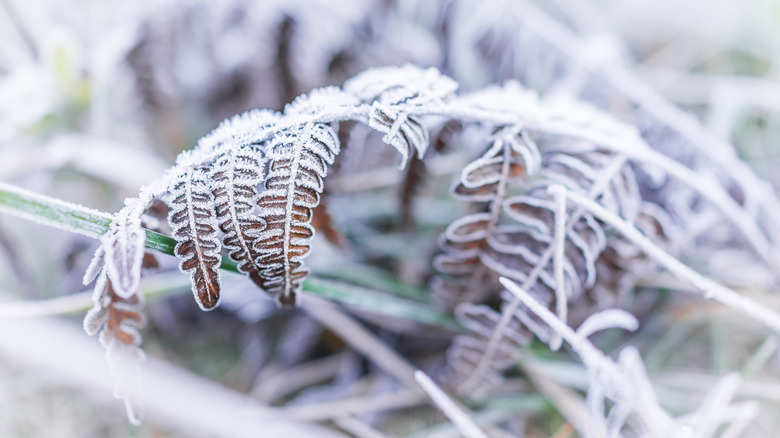Don't Ignore Ferns This Fall- Here's How To Ensure They'll Flourish In Cooler Weather
As gardeners feel a nip of fall in the air, their thoughts turn to garden cleanup, preparing beds and plants for winter, and setting them up for spring success. If outdoor ferns are part of your landscape, you'll want to learn how to care for them in the fall so they thrive during the winter. These fall tasks include cutting, pruning, mulching, and watering.
Tidying up your ferns in the fall by snipping off dead fronds is worth doing, but the plants don't need a full pruning. If your ferns are crowded or overgrown, you should instead consider dividing them in the fall immediately after the first frost. Inspect the center of the fern's clump to see if it's dead or hollowed out, and note whether its leaves seem unusually small. If so, it's likely a good time to divide the plant. Dividing perennials in the fall, of course, will also give you more ferns.
Overwintering your ferns with fall prep
Help your ferns survive the winter by keeping them watered in the fall, maintaining consistently moist soil. Your ferns will also appreciate fall's humidity. These plants benefit greatly from a 2- to 3-inch layer of mulch this time of year, including pine straw or leaves, to protect the roots from freezing over the winter.
You should not fertilize ferns in the fall. Instead, experts recommend doing it in the spring. When you do administer spring fertilizer, use the kind of fertilizer that will leave your ferns luscious and green: a balanced, slow-release fertilizer. Avoid fertilizing new transplants that you've recently divided.
Unlike the tropical ferns that are grown as houseplants, ferns categorized as hardy ferns, along with others such as maidenhair fern (Adiantum pedatum) and sensitive fern (Onoclea sensibilis), can remain outdoors year-round because they withstand frigid winter temperatures. But that's not true for all varieties. The popular Boston fern (Nephrolepis exaltata) is cold-sensitive and can't survive a hard freeze. You can overwinter Boston ferns so they're as good as new in spring by storing them in your shed or garage. Check plant tags for fern cold-hardiness in your area. Paying attention to fern care in the fall will set them up nicely to thrive as temperatures cool.

